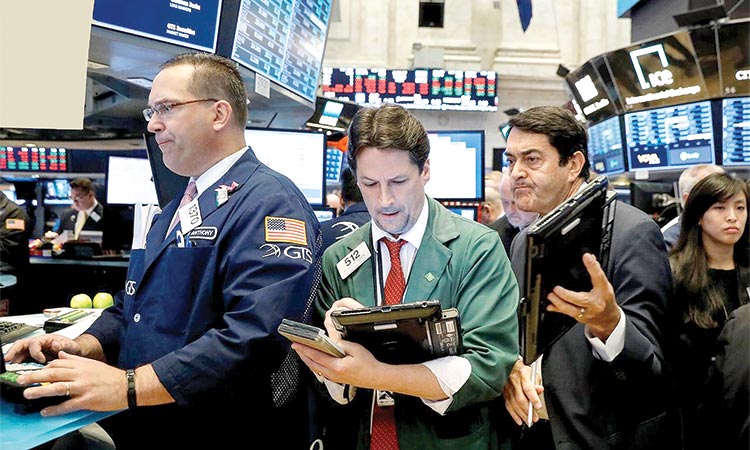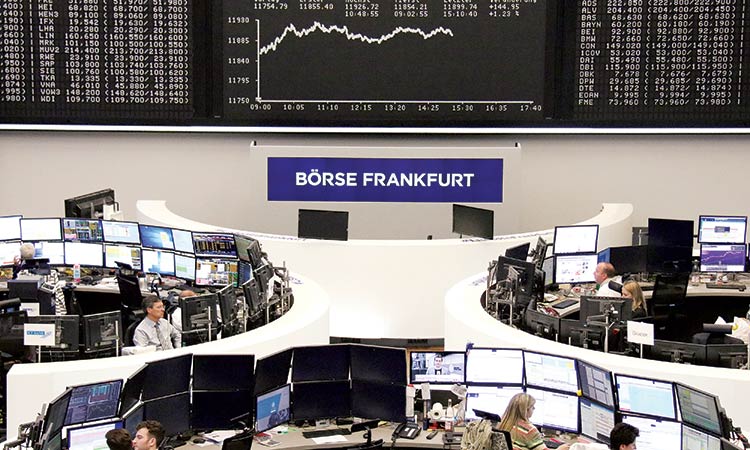US stocks down on US-China trade tensions

Traders work on the floor of the New York Stock Exchange. File
About 15 minutes into trading, the Dow Jones Industrial Average had lost 1.0 per cent to 26,172.42.
The broad-based S&P 500 fell 1.1 per cent to 2,900.19, while the tech-rich Nasdaq Composite Index declined 1.2 per cent to 8,029.78 Hopes that Beijing and Washington could seal a trade deal took a hit over the weekend when President Donald Trump threatened to raise tariffs on Chinese imports as of Friday.
Stocks fell sharply early Monday, although they recovered much of the declines later in the day as investors viewed Trump›s remarks as part of a bargaining strategy.
That cautious optimism evaporated late Monday, when US Trade Representative Robert Lighthizer accused China of reneging on past commitments in the lengthy talks, and confirmed tariffs already in place would more than double to 25 per cent Friday. The renewed tensions raised speculation Beijing would cancel this week›s talks, however, officials in China said Vice Premier Liu He would indeed make the trip.
But the dust-up has shaken market confidence in the inevitability of a deal.
“The stock market will go down big, and stay down for a while, if a trade deal with China falls by the wayside and higher tariff rates become entrenched,” said analyst Patrick O›Hare in a note on Briefing.com.
“The rebound off yesterday›s lows was proof that the market isn›t expecting that to be the outcome.” Anadarko Petroleum advanced 0.2 per cent after announcing that it favored a higher bid from Occidental Petroleum to its deal with Chevron. Anadarko said it would cancel the Chevron bid, although it signaled it would also consider another bid from Chevron.
Occidental rose 0.4 per cent, while Chevron shed 1.2 per cent.
Any retaliatory tariff by India in response to the United States› planned withdrawal of some trade privileges will not be “appropriate” under WTO rules, US Commerce Secretary Wilbur Ross warned on Tuesday.
The comments, made to broadcaster CNBC-TV18 during a trip to India›s capital, come as trade ties between the United States and China worsen. The United States is India›s second-biggest trade partner after China.
Indian officials have raised the prospect of higher import duties on more than 20 US goods if President Donald Trump presses ahead with a plan announced in March to end the Generalized System of Preferences (GSP) for India.
India is the biggest beneficiary of the GSP, which allows preferential duty-free imports of up to $5.6 billion from the South Asian nation.
“Any time a government makes a decision adverse to another one, you will have to anticipate there could be consequences,” Ross said. “We don›t believe under the WTO rules that retaliation by India would be appropriate.”
Meanwhile, Oil prices slipped nearly 2 per cent on Tuesday, on track to fall to their lowest levels in over a month as renewed doubts over US-China trade talks stoked concerns over global growth and demand even though US sanctions on Iran and Venezuela tightened supply and helped stem losses.
Brent futures were down $1.36, or 1.9 per cent, at $69.88 a barrel by 10:39am, while US West Texas Intermediate crude was down $1.14, or 1.8 per cent, at $61.11 per barrel.
If the futures close at their current levels, it would be the lowest settle for Brent since April 4 and WTI since March 29.
US President Donald Trump on Sunday said he would raise tariffs on $200 billion worth of Chinese goods from 10-25 per cent by Friday. The comments dragged on both Asian and US stock markets.
“An escalation in the US-China trade war has brought oil prices under renewed pressure,” said Abhishek Kumar, head of analytics at Interfax Energy in London.
“The spat has reinvigorated demand-side concerns, given that the conflict has been adversely impacting prospects for global economic growth.” On the supply side, oil markets remain tense with the United States tightening sanctions on Iranian oil exports and plans to bulk up its forces in the world›s top oil-exporting region.
US officials announced on Sunday that the movement of an aircraft carrier strike group and a bomber task force towards the Middle East was meant to counter “credible threats,” but Tehran dismissed the move as “psychological warfare.” “The threat of military action with Iran appears to have heightened... This has allowed the oil complex to gain some footing after WTI has been beaten down during the past couple of weeks by some unexpectedly large crude supply increases,” Jim Ritterbusch, president of Ritterbusch and Associates in Chicago, said in a report.
Agencies







